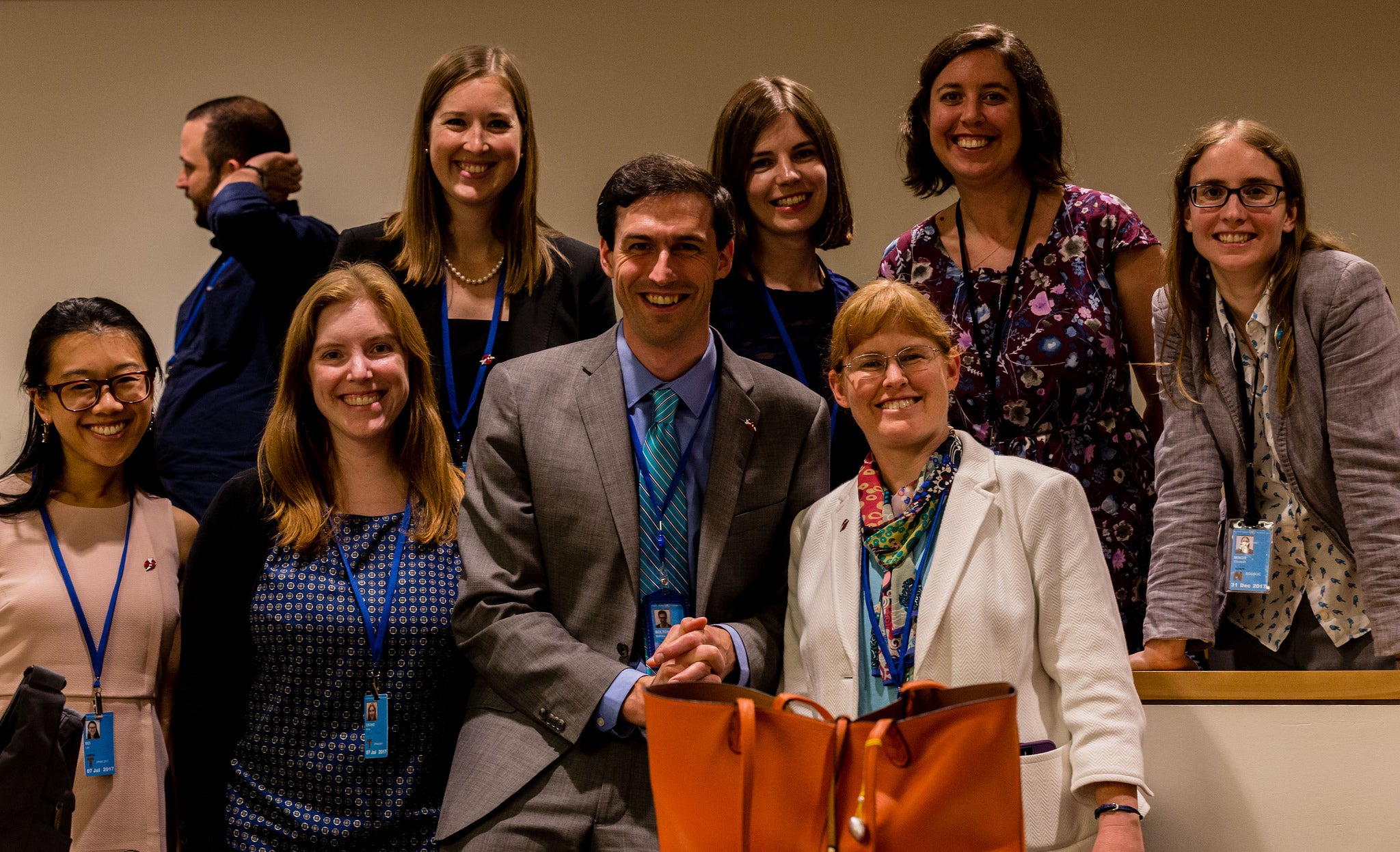The International Campaign to Abolish Nuclear Weapons (ICAN), with which Harvard’s International Human Rights Clinic collaborated during the negotiations of a nuclear weapons ban treaty, received the Nobel Peace Prize today. The honor reflects international recognition of the humanitarian approach to disarmament, a movement that strives to minimize civilian suffering from inhumane weapons.

Credit: Ralf Schlesener Members of the Harvard team (second to right), including Bonnie Docherty, Anna Crowe, and Lan Mei ’17, in a negotiating session of the new treaty to ban nuclear weapons.
Over the past decade, ICAN has changed the course of nuclear disarmament by shifting the focus from national security to the catastrophic humanitarian and environmental consequences these weapons cause. Their work and the invaluable advocacy of survivors of nuclear weapons used in conflict and testing helped lead to an international ban on the weapons this summer.
[pull-content content=”
Banning the Bomb: Reflections on the UN Negotiations for the Nuclear Weapon Ban Treaty
 Carina Bentata Gryting and Alice Osman in the UN General Assembly Hall where the negotiations opened in March 2017.
Carina Bentata Gryting and Alice Osman in the UN General Assembly Hall where the negotiations opened in March 2017.Signing up for the International Human Rights Clinic in spring 2017, we could not have imagined that it would lead us to the United Nations and global negotiations to ban nuclear weapons. With Bonnie Docherty and Anna Crowe as our clinical supervisors, we worked alongside London-based organization Article 36 as well as the International Campaign to Abolish Nuclear Weapons (ICAN), the civil society coalition at the conference. We had the unique opportunity to not only witness, but also actually participate in, norm-building at the international level.
” read_more_link=”http://hrp.law.harvard.edu/arms-and-armed-conflict/banning-the-bomb-reflections-on-the-un-negotiations-for-the-nuclear-weapon-ban-treaty/” read_more_text=”Read more on the IHRC blog” float=”center” background_color=”robin_blue”]
The International Human Rights Clinic joined ICAN and UK-based disarmament organization Article 36 in the efforts to secure adoption of the new Treaty on the Prohibition of Nuclear Weapons. Associate Director of Armed Conflict and Civilian Protection Bonnie Docherty ’01 and Clinical Instructor Anna Crowe LL.M. ’12, along with a team of four students, Carina Bentata Gryting ’18, Molly Doggett ’17, Lan Mei ’17, and Alice Osman LL.M. ’17, provided legal support to the campaign during the treaty negotiations at the United Nations in New York. They also advocated successfully for the inclusion of obligations to assist victims and remediate the environment harmed.
More than 120 countries adopted the treaty in July. Fifty-three have signed the treaty since it opened for signature last month. In so doing, those countries have committed to abiding by the object and purpose of the instrument.

Credit: Ralf Schlesener The “positive obligations” advocacy team, including IHRC students and supervisors, moments after adoption of the nuclear weapon ban treaty on July 7, 2017.
Civil society will now turn its attention to urging more states to sign and ratify the ban treaty. The Clinic in particular will work for strong interpretation and implementation of its provisions.
In their statement announcing the award, the Norwegian Nobel Committee wrote, “It is [our] firm conviction . . . that ICAN, more than anyone else, has in the past year given the efforts to achieve a world without nuclear weapons a new direction and new vigour.”
The committee also praised ICAN for filling a legal gap. Before the treaty, the other weapons of mass destruction—chemical and biological weapons—as well as several indiscriminate conventional weapons had been banned. Yet there were no global restrictions on the use of the world’s deadliest arms.
Although the nuclear weapons states and most of NATO boycotted the negotiations, the treaty and the Nobel Peace Prize highlight the value of declaring nuclear weapons to be illegal as well as immoral. They also increase the stigma against the weapons and show that progress in nuclear disarmament is possible.
The Clinic has long been involved with humanitarian disarmament. It contributed to the negotiations of the 2008 Convention on Cluster Munitions and is currently working to ban or strengthen international law on fully autonomous weapons, incendiary weapons, and the use of explosive weapons in populated areas.
[pull-content content=”
VIDEO: Docherty discusses historic nuclear ban treaty negotiations with disarmament leaders
 Days after the historic nuclear ban treaty negotiations at the UN, two leaders in the disarmament field, Beatrice Fihn, executive director of the International Campaign to Abolish Nuclear Weapons (ICAN), and Richard Moyes, managing director of Article 36, visited HLS to offer their perspectives on the process that led to treaty negotiations. As part of the event, moderated by Lecturer on Law Bonnie Docherty, Fihn and Moyes reflected on the opening session in March, and talked about the work still to be done and their hopes for the final outcome.
Days after the historic nuclear ban treaty negotiations at the UN, two leaders in the disarmament field, Beatrice Fihn, executive director of the International Campaign to Abolish Nuclear Weapons (ICAN), and Richard Moyes, managing director of Article 36, visited HLS to offer their perspectives on the process that led to treaty negotiations. As part of the event, moderated by Lecturer on Law Bonnie Docherty, Fihn and Moyes reflected on the opening session in March, and talked about the work still to be done and their hopes for the final outcome.
” read_more_link=”http://hrp.law.harvard.edu/arms-and-armed-conflict/video-banning-nuclear-weapons-event-featuring-two-leaders-in-the-disarmament-field/” read_more_text=”Watch video of banning nuclear weapons event” float=”center” background_color=”robin_blue”]
